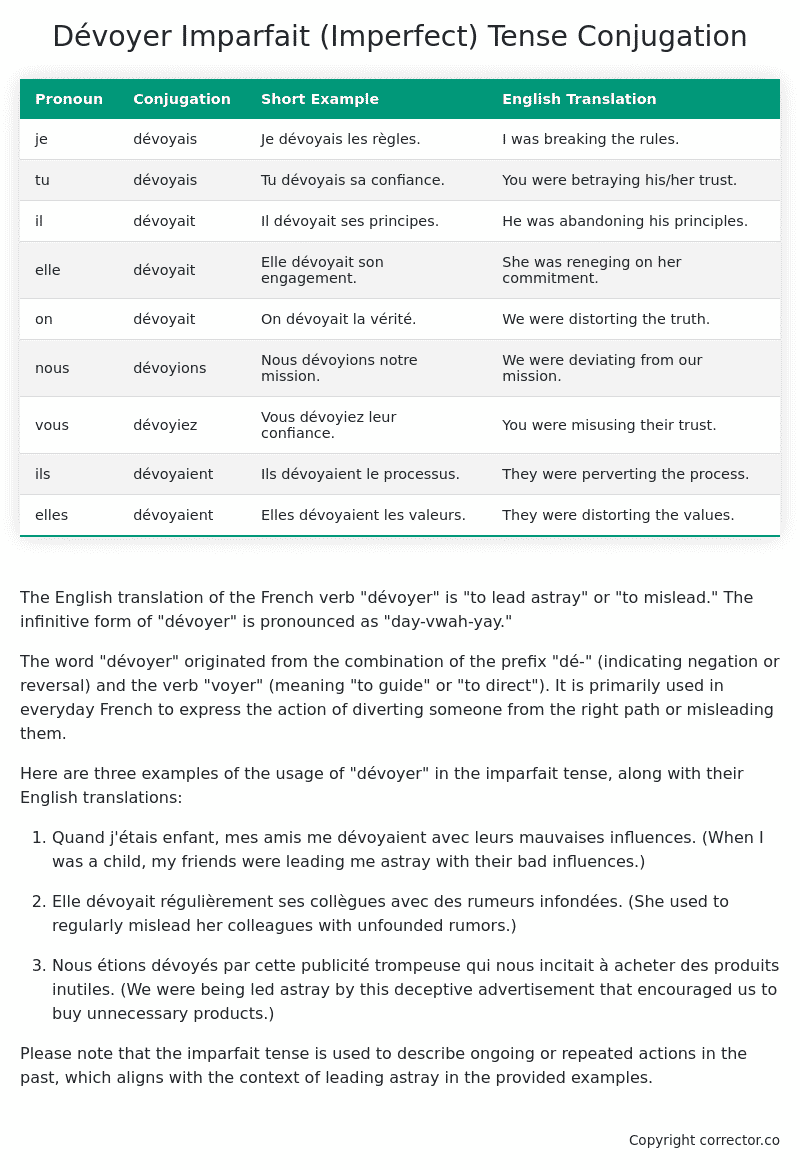Imparfait (Imperfect) Tense Conjugation of the French Verb dévoyer
Introduction to the verb dévoyer
The English translation of the French verb “dévoyer” is “to lead astray” or “to mislead.” The infinitive form of “dévoyer” is pronounced as “day-vwah-yay.”
The word “dévoyer” originated from the combination of the prefix “dé-” (indicating negation or reversal) and the verb “voyer” (meaning “to guide” or “to direct”). It is primarily used in everyday French to express the action of diverting someone from the right path or misleading them.
Here are three examples of the usage of “dévoyer” in the imparfait tense, along with their English translations:
-
Quand j’étais enfant, mes amis me dévoyaient avec leurs mauvaises influences.
(When I was a child, my friends were leading me astray with their bad influences.) -
Elle dévoyait régulièrement ses collègues avec des rumeurs infondées.
(She used to regularly mislead her colleagues with unfounded rumors.) -
Nous étions dévoyés par cette publicité trompeuse qui nous incitait à acheter des produits inutiles.
(We were being led astray by this deceptive advertisement that encouraged us to buy unnecessary products.)
Please note that the imparfait tense is used to describe ongoing or repeated actions in the past, which aligns with the context of leading astray in the provided examples.
Table of the Imparfait (Imperfect) Tense Conjugation of dévoyer
| Pronoun | Conjugation | Short Example | English Translation |
|---|---|---|---|
| je | dévoyais | Je dévoyais les règles. | I was breaking the rules. |
| tu | dévoyais | Tu dévoyais sa confiance. | You were betraying his/her trust. |
| il | dévoyait | Il dévoyait ses principes. | He was abandoning his principles. |
| elle | dévoyait | Elle dévoyait son engagement. | She was reneging on her commitment. |
| on | dévoyait | On dévoyait la vérité. | We were distorting the truth. |
| nous | dévoyions | Nous dévoyions notre mission. | We were deviating from our mission. |
| vous | dévoyiez | Vous dévoyiez leur confiance. | You were misusing their trust. |
| ils | dévoyaient | Ils dévoyaient le processus. | They were perverting the process. |
| elles | dévoyaient | Elles dévoyaient les valeurs. | They were distorting the values. |
Other Conjugations for Dévoyer.
Le Present (Present Tense) Conjugation of the French Verb dévoyer
Imparfait (Imperfect) Tense Conjugation of the French Verb dévoyer (You’re reading it right now!)
Passé Simple (Simple Past) Tense Conjugation of the French Verb dévoyer
Passé Composé (Present Perfect) Tense Conjugation of the French Verb dévoyer
Futur Simple (Simple Future) Tense Conjugation of the French Verb dévoyer
Futur Proche (Near Future) Tense Conjugation of the French Verb dévoyer
Plus-que-parfait (Pluperfect) Tense Conjugation of the French Verb dévoyer
Passé Antérieur (Past Anterior) Tense Conjugation of the French Verb dévoyer
Futur Antérieur (Future Anterior) Tense Conjugation of the French Verb dévoyer
Subjonctif Présent (Subjunctive Present) Tense Conjugation of the French Verb dévoyer
Subjonctif Passé (Subjunctive Past) Tense Conjugation of the French Verb dévoyer
Subjonctif Imparfait (Subjunctive Imperfect) Tense Conjugation of the French Verb dévoyer
Subjonctif Plus-que-parfait (Subjunctive Pluperfect) Tense Conjugation of the French Verb dévoyer
Conditionnel Présent (Conditional Present) Tense Conjugation of the French Verb dévoyer
Conditionnel Passé (Conditional Past) Tense Conjugation of the French Verb dévoyer
Conditionnel Passé II (Conditional Past II) Tense Conjugation of the French Verb dévoyer
L’impératif Présent (Imperative Present) Tense Conjugation of the French Verb dévoyer
L’impératif Passé (Imperative Past) Tense Conjugation of the French Verb dévoyer
L’infinitif Présent (Infinitive Present) Tense Conjugation of the French Verb dévoyer
L’infinitif Passé (Infinitive Past) Tense Conjugation of the French Verb dévoyer
Le Participe Présent (Present Participle) Tense Conjugation of the French Verb dévoyer
Le Participe Passé (Past Participle) Tense Conjugation of the French Verb dévoyer
Struggling with French verbs or the language in general? Why not use our free French Grammar Checker – no registration required!
Get a FREE Download Study Sheet of this Conjugation 🔥
Simply right click the image below, click “save image” and get your free reference for the dévoyer imparfait tense conjugation!

Dévoyer – About the French Imparfait Tense
NOTE: To take a deep dive into all the French tenses then see our article on Mastering French Tense Conjugation.
Formation of the Imparfait Tense
For regular -er verbs:
For regular -ir verbs
For regular -re verbs
Common Everyday Usage Patterns
Description of Past Habits
Background Information
Mental and Emotional States
It’s employed to express emotions, thoughts, or physical sensations in the past. For example: “J’étais content quand il est arrivé.” (I was happy when he arrived.)
Ongoing Actions
Points to Note About the Imparfait Tense
Passé Composé vs. Imparfait
Conditional
Si Clauses
Narration
I hope you enjoyed this article on the verb dévoyer. Still in a learning mood? Check out another TOTALLY random French verb imparfait conjugation!


